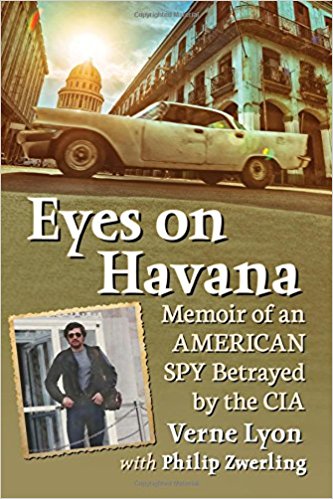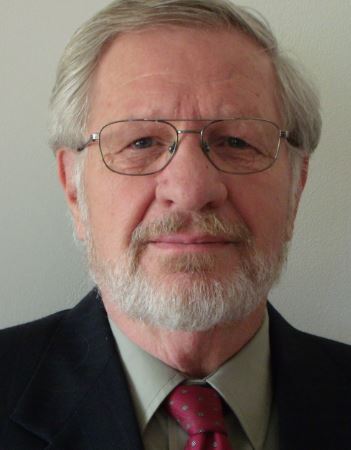J. Michael Springmann reviews the new book Eyes on Havana: Memoir of an American Spy Betrayed by the CIA by Verne Lyon for Truth and Shadows. McFarland (February 6, 2018), 227 pages.
February 14, 2018
By J. Michael Springmann (Special to Truth and Shadows)
 If you
If you  want the truth, don’t go to the CIA, read Verne Lyon’s book. It is a reality check. It demonstrates how the United States government really works and how the Central Intelligence Agency (CIA, the Agency) is a totally out of control organization, accountable to no one and no thing.
want the truth, don’t go to the CIA, read Verne Lyon’s book. It is a reality check. It demonstrates how the United States government really works and how the Central Intelligence Agency (CIA, the Agency) is a totally out of control organization, accountable to no one and no thing.
Verne, whom I’ve known personally for many years, had his first contact with the CIA as a college student at Iowa State University in 1965. As part of Operation CHAOS, a massive surveillance program, he was recruited to attend anti-Vietnam War demonstrations and spy on fellow students and professors, obtaining their views on the conflict. Provided a draft deferment, a promise of future employment, and a monthly stipend, Verne accepted the job, believing, as a patriot and “all-American boy,” that his government could do no wrong.
When he tried to resign, he was framed for a mysterious explosion at Lambert Field, St. Louis, where he had been working as an aerospace engineer for McDonnell Aviation. Told he could take his chances in court or go to Cuba as a NOC, Non-Official Cover Clandestine Service Officer, he went to Cuba. (NOC – someone operating abroad for the Agency without the protection of a diplomatic passport). There, he recruited agents, obtained information, and poisoned school children’s milk.
Poisoned milk? One U.S. government employee I told refused to believe that. Get the book and turn to pp. 103-104. Here’s the condensed story:
To limit the amount of food coming into Havana, Verne and his agents would puncture tires on trucks loaded with foodstuffs. The idea was to make the contents spoil in the tropic heat. Learning of a new secondary school opening in the countryside, they bribed a truck driver conveying a week’s supply of milk to the institution. After paying the man to step away from his vehicle and “turn a blind eye” to events, Verne had a dissident pour a sack of powdered concrete into the milk. As Verne wrote, “How low had we fallen? It made me sick, too. We couldn’t win hearts and minds by waging war on school children…I voiced my opposition to TIO [Uncle Sam] but to no avail.”
In 1973, tiring of this, and appalled by his own actions, he decided to resign, sending the notice through the diplomatic pouch. About that time, all communications from Uncle Sam slowly dwindled and then ceased, his American passport was canceled, and Cuban counter-intelligence was onto him. Whether the latter was connected to the former is not known.
Fleeing to Canada without the wife he had married in Havana and her son, he contacted Royal Canadian Mounted Police intelligence officers in Winnipeg. After he sought asylum and “landed immigrant status” (legal permanent residence), Federal Bureau of Investigation (FBI) “Special” Agents attempted to kidnap him.

Lyon: sentenced to 17 years.
Agent Merle Nelson from Grand Forks, North Dakota, along with his friend, the Winnipeg chief of police, hatched a plot to grab Verne in town, drive him to the frontier, and hand him over to more FBI officials in the U.S. Picked up by RCMP officers he didn’t know, he was convoyed towards the border. One RCMP man, Sgt. Howard Comba, thought this was odd and he listened as Verne told him to contact his attorney and an officer at RCMP Intelligence. After making a few calls, Comba turned his car around and drove to headquarters in Winnipeg where the sordid story finally came out. They released Verne and the FBI returned to the U.S. empty-handed.
After U.S. diplomatic pressure proved too much for the Canadian government, Mr. Lyon had to leave and travel to Peru on a diplomatic safe conduct. While seeking refuge in Lima, he was grabbed on the street and handed over to U.S. Marshals at the airport.
Back in America, “home of the free and land of the brave,” the U.S. Justice Department tried him for the earlier bombing. Using “national security” to circumvent federal Supreme Court decisions and rules of criminal procedure protecting defendants, the Justice Department kept his CIA background, which could have exculpated him, from his attorneys and the judge.
Sentenced to 17 years in prison at Leavenworth, Kansas, Verne was paroled after 68 months. Struggling to find a job, he joined what became the Association of National Security Alumni (ANSA) and began running a non-profit group, the Hispanic Ministry of the United Methodist Church, a social services agency that provided support to Latino aliens in the Des Moines, Iowa area. When that ended, he joined the Vermeer Corporation, a construction and agricultural equipment manufacturer. This was not a series of happy endings. He had to endure layoffs, inability to find employment, and other governmental harassment.
As noted, Verne is an old friend from when we were both members of the Association of National Security Alumni to the present. His remarks and remembrances and analysis in this work jibe with what he’s told me personally. And, in Eyes on Havana, he supplies much greater detail.
I don’t know which is more frightening, disgusting, or horrifying: that the CIA exists; that it recruits students on campus; that it engages in covert actions, such as poisoning school children’s milk; or that there are no controls on it or on its actions, many of which involve the overthrow of governments, murder of politicians, and interference in U.S. internal affairs.
Eyes on Havana is not a scholarly investigation of governmental operations. It is not an in-depth analysis of intelligence work. Rather, it is both: through 216 pages of “show and tell.” It recounts Verne Lyon’s experiences, his background and interest in aerospace, and his fatal trust in his own government. It is a meticulous reconstruction of his life, in the real world as well as in the “alternate existence” of the CIA.
Verne’s book demonstrates the truth of ANSA’s guiding principle: Covert actions are counterproductive and damaging to the national interest of the United States. They are inimical to the operation of an effective national intelligence system, corruptive of civil liberties, including the functioning of the judiciary and a free press. More importantly, they contradict the principles of democracy, national self-determination and international law to which the United States is publicly committed.
Too much to swallow? Chew on these excerpts from the book’s last page:
…Those who still believe the CIA…must still believe all their other lies: the weapons of mass destruction never found in Iraq, the Gulf of Tonkin incident that never occurred but drew us deeper into the Vietnam War…and so on throughout history. [Think about the lies justifying the destruction of Yugoslavia, Libya, Syria, and Yemen.]
…we cannot trust a government committed to manipulating us, the people, through lies and deception. Ironically, the CIA displays these words from the Gospel of John, chapter 8,verse 32 at its headquarters: “And ye shall know the Truth and the Truth shall make you free…”
The Truth is not on the walls of the CIA; it is between the pages of Eyes on Havana.
You can buy Eyes on Havana: Memoir of an American Spy Betrayed by the CIA through Amazon.
Looks great! Many thanks, Craig Mike
Thanks for writing such a great review, Mike! And thanks for letting us know about this important book.
Thanks Michael and Craig for this. I presume the reviewer is the same Michael Springmann, former US diplomat, we see on YouTube?
Yes, indeed. Michael is also the author of Visas for Al Qaeda: CIA Handouts That Rocked the World and Goodbye, Europe? Hello, Chaos?: Merkel’s Migrant Bomb.
The combination of a reviewer who knows intimately both the territory of a book as well as the book’s author can make for a very strong review, which Mike Springmann’s is. As I type this I have in front of me Doug Valentine’s book The CIA as Organized Crime: How Illegal Operations Corrupt America and the World.
How long can an organization that combines tunnel vision, psychopathy and virtually unlimited funds be curbed? Since no political will for reform has been seen since the Church Committee of the mid-1970s, apparently curbing can only be launched by courageous outlier insiders who finally see a little bit of light between what they routinely do and what they should not be doing, for the reasons Lyon provides in his memoir and Springmann amplifies in his review.
To call self reform even a thin thread to pin our hopes on is a considerable exaggeration. Insiders who question the ethos or the very dirty tricks of “the Company” are soon harassed or worse, find themselves in jail like Lyons, or become outsiders—if they survive alive.
The CIA appears to be an institution for the morally insane, who are well paid and protected to live out their lives of betrayal of anyone except their own deluded fellow inmates.
Hi Craig thanks for this. Have you seen or do you have any information on this story about Lee Wanta?
http://eagleonetowanta.com/wp-content/uploads/2015/03/WANTA-Book.pdf
I can’t say that I do, but I’ll check out your link.
Good review. Another book I highly recommend about what the CIA really is up to, is “The CIA as Organized Crime” by Douglas Valentine.
Good review Mike. Incidentally, Verne’s book is as much a condemnation of the US “justice” system as it is of the CIA.–Dave